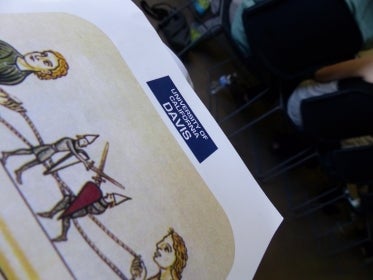The Digital Premodern: From Codex to Code + Medievalism and Video Games conference took place this past weekend at the University of California Davis. From May 1st to 3rd, academics from various institutions in Canada and the United States gathered on the UC Davis campus ModLab for this event hosted by the Digital Premodern Research Cluster.

Organized and executed by department chair Colin Milburn, professor Claire Waters, and postdoctoral fellow member Amanda Phillips, this innovative conference brought together students and faculty alike to discuss the relations between medievalism, neo-medievalism, or other periods in premodern studies and digital gaming.
Director Neil Randall, was among the host of presenters representing The Games Institute of the University of Waterloo. Joining him were Masters student Becky Anderson, and PhD candidates Emma Vossen and Elise Vist.
For more information about what the GI members and other attendees of the conference were up to at UC Davis, visit the ModLab project page or check out the event gallery images!
Whether they serve as inspiration for new digital societies or as the raw material for remediated texts, the imagery, events, narratives, and sociopolitical structures of the Middle Ages sit at the heart of gaming culture. Retellings of canonical texts like and Inferno have made their way into mainstream gaming, while fantastical digital universes such as World of Warcraft and Dragon Age draw from later medievalisms like Dungeons and Dragons and the works of Tolkien for their inspiration. The ludic and technical structures of video games also provide different challenges and affordances for neomedieval expression. One might explore digitally restored landmarks, reenact or alter historical events, or interact with simulated material objects like scrolls and books in new ways. Source (http://modlab.ucdavis.edu/projects/socialprojects/medievalism2015/)